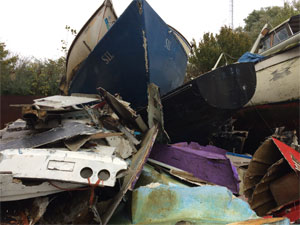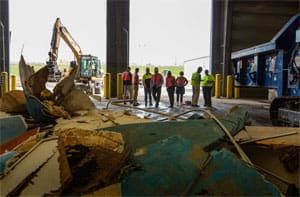For the boat owner, one of the best features of fiberglass is that it doesn’t rot. For waterfront towns, however, the worst attribute of fiberglass is that it doesn’t rot. Unlike wooden boats that tend to disintegrate when abandoned, fiberglass boats hang around. Abandoned fiberglass boats can become eyesores and a cleanup problem for local government. Now the state of Rhode Island, along with the Rhode Island Marine Trades Association (RIMTA), has begun a program called the Rhode Island Fiberglass Vessel Recycling (RIFVR) Pilot Project.
This pilot program will, according to the RIMTA website, “explore solutions for the sustainable disposal of fiberglass boats by dismantling and reprocessing fiberglass hulls into cement as an alternative to landfill.”
 |
|
Courtesy RIMTA |
According RIMTA, “Between 2003 and 2012, an estimated 1.5 million recreational craft were retired in the U.S.” That is a substantial amount of classic plastic to dispose of. The RIFVR program has studied boat recycling efforts in Europe, and is assembling a database of “best practices” to use in Rhode Island, as well as to disseminate to other government entities around the country.
“We are continuing to answer critical questions surrounding the life cycle of recreational boats and the sustainable reuse of fiberglass waste,” RIMTA project manager Evan Ridley said in a statement on the website.
Funding for the effort is coming from support from 11th Hour Racing, the Association of Marina Industries, Boat-US Foundation and the Rhode Island Resource Recovery Corporation. Project organizers are actively seeking further funding from stakeholders inside and outside the marine and composites industries.

